- Home
- Joy Fielding
The Final Act Page 10
The Final Act Read online
Page 10
And yet Cindy knew that beneath all the bravado lay a bundle of insecurities, wriggling like snakes inside a canvas bag. Unlike Heather, who had the confidence but not the attitude, Julia had the attitude without the confidence. It was an interesting contradiction, Cindy thought, removing several of the head shots from the top of the pile to give to the police. She thought of the pictures in her pocket. Can’t very well show these to the police, she thought, removing them from her pocket and glancing through them.
“Cindy?” Tom appeared in the doorway, as if he’d been lurking there all along, just waiting for the right moment to pop into view. Clearly a man who understood the value of good timing, who knew how to make an entrance. “What’s taking you so long? The police are waiting.”
Cindy jumped to her feet, only to stand frozen to the spot, unable to move.
“What’s going on?” Tom said, “What are you doing?” He walked to her side and removed the pictures from Cindy’s hand.
“I found them in Sean’s apartment.”
“She looks pretty good,” Tom remarked casually.
Cindy shook her head in dismay. “You’re unbelievable.”
“Come on, Cindy. Lighten up. You can’t see anything.”
“You can see she’s naked.”
“You can also see she’s enjoying herself thoroughly.”
“Which makes it all right?”
“Which makes it none of our business.”
“She’s your daughter!”
“She’s a consenting adult.”
“Do you think I should show these pictures to the police?”
“Only if you want to cloud the issue,” he warned her.
“What do you mean?”
“I mean the police are easily distracted. One look at these and they aren’t going to take your concerns too seriously. I thought the objective here was to find our daughter.”
“So suddenly I’m not overreacting?”
“Of course you’re overreacting. It’s part of your charm.”
“Don’t patronize me.”
“Don’t punish me for something that happened seven years ago.”
Cindy’s eyes widened in disbelief. “You think this is about you? About our divorce?”
“Isn’t it?”
“It’s about our daughter.”
“Our daughter who’s missing,” he reminded her, as if she didn’t know.
The air rushed from Cindy’s lungs. “You don’t think something’s happened to her, do you?”
“No, I don’t,” Tom said evenly. “I think she just decided to get away for a few days.”
“Without telling anyone?”
Tom shrugged, “It wouldn’t be the first time.”
“She’s done this before?”
“Once,” he admitted. “She was upset about my getting married, so she took off, came back a couple of days later, apologized, said she’d just needed some time to get her head clear.”
“And you didn’t tell me?”
“I didn’t want to worry you unnecessarily.” He reached over, touched her arm. “I know our daughter. She likes to stir things up a little. Like her mother,” he added with a smile.
Cindy looked toward the window. “You’re so full of shit,” she said.
“Maybe,” he conceded. “But I still think we should wait until Tuesday before dispatching the troops, or we’re going to be awfully embarrassed when Julia comes waltzing home.”
“I don’t give a rat’s ass about being embarrassed.”
“Really, Cindy, your language. . .”
“Fuck you,” Cindy told her ex-husband, watched him wince.
“Well, I guess there’s a certain comfort in knowing that some things never change.” He shook his head. “Look. Your accountant suggested I call Michael Kinsolving to see if Julia showed up for her audition. Who knows? Maybe she mentioned something to him about her plans for the weekend.”
“Do you think that’s possible?”
“Anything’s possible. Come on, the police are waiting.” They were halfway down the stairs before Cindy realized that Tom hadn’t returned the photographs of Julia. She was about to ask for them back when one of the police officers appeared at the bottom of the stairs, staring toward them expectantly.
Cindy watched her former husband smile as he slipped the provocative photographs of Julia into the pocket of his linen pants.
TEN
MAY BE she eloped,” the Cookie was suggesting to the second police officer as Cindy and her ex-husband re-entered the living room beside Detective Andy Bartolli. Detective Bartolli was the elder of the two men, and the stockier; his partner, Detective Tyrone Gill, was younger by a decade and taller by several inches. Both had necks the size of tree stumps.
“What did you say?” Cindy felt the sudden constraint of Tom’s hand on her arm, as if he feared she was about to throw herself at his wife’s head.
The Cookie tossed long red hair from one shoulder to the other. “Maybe she eloped,” she repeated, as if she really thought Cindy might not have heard her the first time.
Cindy stole a glance at the two detectives, sensing their interest already starting to wane.
There’s no urgency here, the looks they exchanged suggested.
“What makes you think she might have eloped?” Detective Bartolli asked.
“Julia would never elope,” Cindy interjected.
“Oh, please,” the Cookie said. “How many times have I had to listen to that stupid story about you and Tom running off to Niagara Falls without telling anyone? She thought it was so romantic.”
She did? Cindy fought back tears. Julia had never said anything of the sort to her.
The police waited as Tom called Michael Kinsolving, whose assistant said the famous director had left town until Tuesday and couldn’t be reached, although the assistant confirmed that Julia had indeed shown up for her fifteen-minute audition promptly at eleven o’clock.
After asking several pointed questions about Julia’s recent state of mind—Has she been depressed lately? How upset was she about the breakup with her boyfriend?—the policemen left with several copies of her head shots, promising to phone as soon as they spoke to Sean Banack. With Tom’s approval, and over Cindy’s objections, they decided to wait until after the long weekend before launching a more formal investigation.
“What now?” Cindy asked when they were gone.
“Try to relax,” her ex-husband advised. “Call me in Muskoka if you hear anything.”
“You’re going to the cottage?” Cindy asked incredulously.
“I can’t do anything here.”
“Julia’s fine,” the Cookie said with a yawn. “She’s a big girl. She probably just needed some time away from her mother.”
“Would somebody please get this moron out of my house?” Cindy pleaded, looking from Tom to Neil.
The Cookie turned a sickly shade of beige that perfectly matched her outfit. The dog started barking. “I think it’s time we left,” Tom said.
“Yes. You’re very good at that,” Cindy agreed, only half under her breath.
The phone rang. Both Tom and Cindy strode purposefully into the kitchen, colliding in the doorway as they reached for the phone. “Hello,” Cindy said, pressing the phone to her ear, her eyes warning Tom to back off.
“What’s wrong?” her mother asked.
Cindy’s shoulders slumped with disappointment. “What makes you think something’s wrong, Mom?”
Tom rolled his eyes toward the ceiling. So that’s where Julia gets it, Cindy thought.
“A mother always knows when something’s wrong,” her mother said, and Cindy felt her heart sink, thinking of Julia.
“We’ll go,” Tom whispered.
“Who’s that?” her mother asked. “Was that Tom?”
“You’re amazing, Mother.” Cindy watched Tom usher the Cookie out the front door.
“What’s he doing there? Now I know something’s wrong.”
“It
’s nothing.”
“I’ll be right there.”
“No. Mom! Mother! Damn it!” She dropped the phone into its carriage. “Shit!”
“What’s up?” Neil asked good-naturedly, coming into the kitchen.
“My mother’s coming over. Sorry for the language,” she said, still smarting from Tom’s earlier admonition.
“What language?”
Cindy fought the urge to kiss him full on the mouth. “You should probably go.”
“I’m happy to stay.”
And I would dearly love you to stay, Cindy thought. “I think you’ve met enough of my family for one day,” she said instead, walking him to the door, thinking how his body contrasted with Tom’s. While both men were approximately the same height and weight, Tom had a way of overwhelming everything in his path, rather like Julia. Neil was more like Heather, an easier, more accommodating fit. “Thank you,” Cindy told him, both eager and reluctant to say good-bye. Talk about bad timing. “I don’t think I could have managed without you.”
He smiled. “I bet you say that to all your accountants.”
Cindy reached out, touched his cheek. Beside her, Elvis growled. “Got a little more than you bargained for, didn’t you?”
“I’ll call you later,” he said, patting Elvis on the head.
She watched him back his car out of the driveway. “I won’t hold my breath,” she said wistfully, as his car disappeared down the street.
It was only then that Cindy became aware that she herself was being watched. She swiveled toward her neighbor’s house. “Faith,” she said, returning the other woman’s wan smile. “I didn’t see you there. How are you feeling?”
“Fine.” Faith Sellick was wearing a sloppy red-and-black-checkered shirt over a pair of black capris. A red ribbon dangled from her hair. “Lots of activity at your house today.”
“Yes.”
“I saw the police car.”
“It was nothing.”
Faith nodded, stared at the street.
“Where’s the baby?”
“Ryan took him to the office this morning.”
“That was nice of him. It gives you a chance to relax.”
“I guess.”
“It’s such a beautiful day,” Cindy remarked when she could think of nothing else to say. “Would you like a cup of tea?” she heard herself ask, realizing she was reluctant to go back inside the house, that she was afraid to be alone. Time alone meant time to think. Time to think meant time to worry. Time to worry meant time to imagine the worst.
“That would be nice,” Faith said, carefully measuring out each word. “Tea would be very nice.”
“Good. Come on over.”
She walks as if she’s asleep, Cindy observed, her eyes following Faith Sellick as the young woman floated down her front steps and along the sidewalk. Elvis ran forward to nip at her heels.
“Hello, boy,” Faith said absently.
“Come inside.” Cindy stood back to let Faith enter.
“This is really very sweet of you.”
“My pleasure.” Cindy led Faith into the kitchen, motioned toward the four pine chairs at the rectangular pine table. Faith sank into the closest one, stared at Cindy expectantly. “Regular or herbal?” Cindy asked as Elvis spread himself across the top of Faith’s feet.
Faith said nothing, and for a moment, Cindy wondered if she’d understood the question. She was about to ask it again when Faith finally answered. “Herbal,” she said, her sudden smile at odds with the sadness in her eyes.
“Ginger peach or spearmint?”
“Spearmint.” Faith laughed, a delicate tinkle that danced in the air like wind chimes.
Cindy filled the kettle with water, turned on the burner, turned back to Faith, thinking that the young woman looked much older than her years, closer to forty than thirty, Cindy thought, noting the dark circles rimming Faith’s eyes, the sallowness of her complexion. “Did you get any sleep at all last night?”
Faith nodded. “A bit.”
“It’s not easy being a new mother.” Cindy pictured Julia as a baby. “It’s not easy being a mother, period,” she added, picturing her now.
“Seems easy enough for most people.”
“Don’t kid yourself.”
“Your girls are so beautiful. They’ve turned out so well.”
“Thank you.” Cindy crossed her fingers, said a silent prayer.
“Did you worry about them a lot when they were babies?”
“Of course.”
“I worry about Kyle all the time.”
“That’s perfectly normal.”
“I worry about everything,” Faith continued as if Cindy hadn’t spoken. “His safety, his health, whether he’ll be happy when he grows up.”
“I don’t think you ever really stop worrying about those things.” Again Cindy thought of Julia.
“I mean, look at what’s going on in the world today. Terrorists, suicide bombers, AIDS, poverty, child abuse. . .”
“Faith,” Cindy advised gently, interrupting the seamless flow of catastrophes, “you’ll make yourself nuts if you worry about all those things.”
“How can you not worry? All you have to do is pick up the morning paper.”
“Don’t pick it up.”
“You have to know what’s happening. You can’t just bury your head in the sand.”
“Why can’t you?”
“Because things won’t get any better that way.”
“And you think worrying yourself sick is going to make things better?”
“No, but you should be aware.”
“You can be aware again when Kyle starts sleeping through the night.”
“It just doesn’t seem right to bring a child into a world where so many bad things are happening, where there are so many evil people.”
“There are good people too,” Cindy said, trying to reassure them both.
“I try to be a good person.”
“You are a good person.”
Faith grimaced, as if she’d had a sudden spasm. “I’m not a very good mother.”
“Why would you think that?”
“Kyle cries all the time.”
“He has colic. It has nothing to do with you.”
“I try to comfort him. I feed him. I hold him. I even sing to him. But he still cries.”
“Julia was the same when she was a baby. The only one who could get her to stop crying was Tom.”
“Tom’s your ex-husband?”
“Yes.”
“Was that him before? With the redhead?”
“That was him.”
“Is she his new girlfriend?”
“Wife.”
“I think Ryan has a girlfriend,” Faith said matter-of-factly as the kettle began whistling.
“No,” Cindy started, then stopped. How would she know whether or not Ryan had a girlfriend? “What makes you say that?” she asked, busying herself with making the tea.
“I can see it in his eyes.”
“What do you see?”
“It’s more what I don’t see.”
Cindy understood without asking exactly what Faith meant. She’d seen the same lack of substance in Tom’s eyes before he walked out, as if he were already gone. Still she said, “He’s probably just tired.”
“No. It’s more than that. Less,” she corrected. “I don’t think he loves me anymore.”
“I’m sure Ryan loves you, Faith.” Cindy pictured Ryan’s troubled face as he sat on his front steps, Elvis’s head in his lap. The subtle scent of spearmint filled the air as Cindy deposited the steaming mug of herbal tea on the table in front of Faith. “He’s just worried about you, that’s all.”
“Worry isn’t love.” Faith lifted the mug to her lips, quickly laid it back down. “It’s hot.”
“Better give it a few minutes to cool off.”
“My grandmother used to say that.” Faith smiled at the memory. “ ’Give it a few minutes to cool off,’ ” sh
e repeated in a voice not her own. “She died last year. Cancer.”
“I’m sorry.”
“She’d had this really hard life. Her oldest son committed suicide, you know.”
“How awful.”
“Yeah. My uncle Barry. He was schizophrenic. I don’t really remember him. He died when I was still a kid. He hanged himself in the bathroom. My grandmother found him.” Faith raised the mug to her lips a second time, breathed in the aromatic steam still rising from its surface. “Suicide kind of runs in my family.”
“What?” Cindy recalled Detective Bartolli’s questions about her daughter’s recent state of mind. Has she been depressed lately? How upset was she about the breakup with her boyfriend?
“I had a great-aunt who threw herself off a tall building,” Faith was saying, “and two cousins who slashed their wrists. And my mom took too many pills once, but then she called all the neighbors and told them what she’d done, so they rushed her to the hospital and she had to have her stomach pumped.”
“That’s terrible.” Cindy gingerly sipped at her tea, not quite sure what to say next. “You would never . . .”
Julia would never . . .
“What? Oh. Oh no! No, of course not. I would never do anything like that.”
“Because things are never as black as they seem,” Cindy said earnestly, the cliché filling her mouth like a wad of cottonballs. “Things always get better.” Unless they get worse, she added silently.
“I don’t have the courage to kill myself,” Faith was saying.
“You think it’s a question of courage?”
Has she been depressed lately?
“I know some people consider suicide the coward’s way out, but I never thought of it that way. I mean, to do something as drastic as taking your own life, I think that requires tremendous guts. More guts than I have, that’s for sure.”
“Good.” Cindy suppressed a shudder as she settled into the chair across from Faith, vaguely recalling an article she’d read about the ripple effect of suicide, how the suicide of one family member often served to validate another’s, that such action came to be seen as an acceptable alternative, a viable option for solving one’s problems. She shook her head. The women in her family might be emotional, headstrong, and impulsive, but they were definitely not suicidal. And they were far too interested in having the last word to take themselves out of the argument early. “Because you have everything to live for,” Cindy heard herself continue. “I mean, it’s hard now. You’re going through a very difficult time. You’re exhausted. Your hormones are raging. But it’ll get better. Trust me. A year from now, you’ll feel so much better about everything.”

 The Stranger Next Door
The Stranger Next Door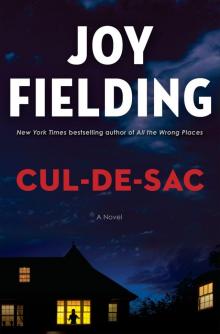 Cul-de-sac
Cul-de-sac The Final Act
The Final Act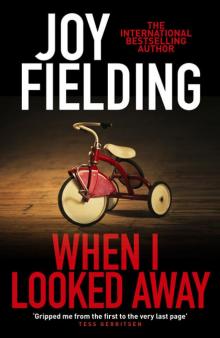 When I Looked Away
When I Looked Away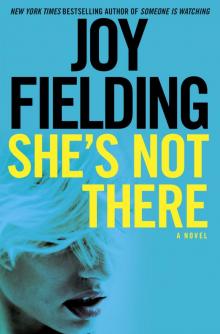 She's Not There
She's Not There All the Wrong Places
All the Wrong Places Now You See Her
Now You See Her Don't Cry Now
Don't Cry Now Good Intentions
Good Intentions Still Life
Still Life Lost
Lost The First Time
The First Time Whispers and Lies
Whispers and Lies The Other Woman
The Other Woman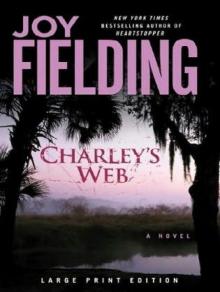 Charley's Web
Charley's Web Mad River Road
Mad River Road Puppet
Puppet Life Penalty
Life Penalty The Wild Zone
The Wild Zone Home Invasion
Home Invasion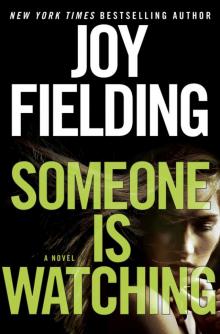 Someone Is Watching
Someone Is Watching Heartstopper
Heartstopper See Jane Run
See Jane Run The Bad Daughter
The Bad Daughter Shadow Creek
Shadow Creek Missing Pieces
Missing Pieces Kiss Mommy Goodbye
Kiss Mommy Goodbye Grand Avenue
Grand Avenue